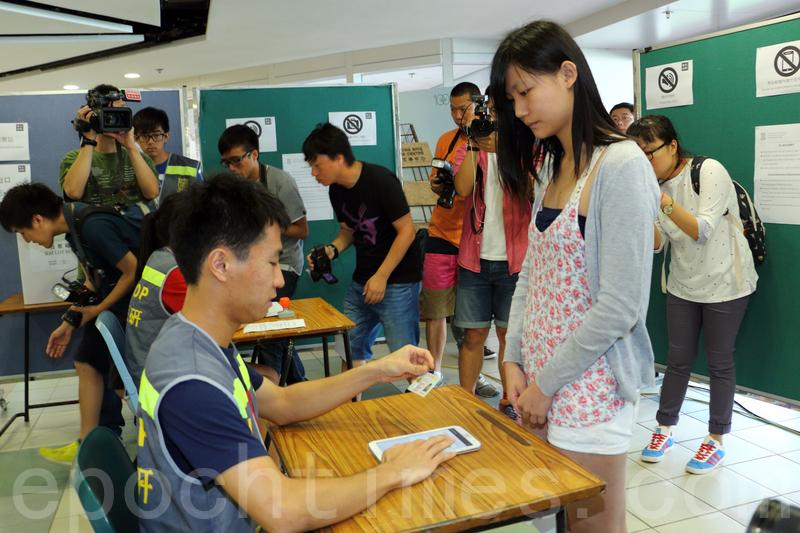HONG KONG—Mostly the elderly turned out to exercise the muscles of democracy in Hong Kong Sunday morning, the third day of an informal referendum aimed at helping determine the territory’s political future. By the end of the day, nearly 700,000 people, of all ages, had voted endorsing universal suffrage, the principle of one person-one vote.
“Hong Kong people are truly magnificent,” said Benny Tai Yiu Ting, a well-known public figure in Hong Kong and one of the organizers of the civil protest movement, Occupy Central With Love and Peace, which plans to stage sit-ins to push for greater democracy in Hong Kong.
The referendum being taken in Hong Kong is not for a political candidate, and it’s not even being held by the government. Instead, Hong Kong citizens are voting in an informal poll, organized by two universities, to attempt to secure their right to actually select the candidates that they hope to be able to vote for in the future.
Right now, the Communist Party in Beijing controls who Hong Kong people are allowed to vote into office as chief executive of the quasi-autonomous territory through a complicated election process.
“Although Beijing authorities have attacked us again and again … we didn’t fall,” said Tai Yiu Ting, in an interview with Hong Kong media. “We want Beijing authorities to know that every Hong Kong citizen who wants real universal suffrage has the chance to vote.”
Angry China
It’s the latest development in the struggle for universal suffrage—and Beijing is not happy about it.
In fact, the Communist Party is so unhappy about that—so many here believe—they brought down the website for online voting, popvote.hk, through a coordinated hacking offensive.
Massive Attack
The American Web company CloudFlare is hosting the website for the poll. The company, which is often called in to take care of attacks that bring down websites, said in a statement that the attack on the Hong Kong site was “one of the largest and most persistent Distributed Denial of Service (DDoS) attacks in the history of the Internet.” A DDoS attack uses a network of computers to bombard a target with an overwhelming amount of traffic, effectively taking them off the Internet.
CloudFlare CEO, Matthew Prince, wrote on Twitter: “Battling 300Gbps+ attack right now,” on the first day that the vote began. Three hundred gigabits per second is an enormous amount of data.
Undeterred
By all accounts, the shutdown only further motivated Hong Kong residents to assert their rights, turning out in droves at the 15 polling booths that now run for 12 hours a day until June 29.
The vote was originally only scheduled for three days—June 20 to June 22—but the deadline was extended a week due to the computer network attacks.
Chan Kin-man, an organizer of the Occupy Central movement, expressed a similar view in an interview with Voice of America. “We’ve seen that Hong Kong people do have passion on this issue. I believe it’s because of the white paper and the cyberattack,” he said.
“They are very unsatisfied with the crackdown on citizen’s most basic rights, and came out to vote. I feel very hopeful for Hong Kong.”
Pressure
Indeed, recent pressure from the Chinese Communist Party appears to have galvanized the feelings of the public.
A recent white paper issued by the State Council Information Office, whose Communist Party name is the Office for Foreign Propaganda, aroused deep resentment in the public. The white paper sought to reinterpret the principle of one country–two systems under which Hong Kong is governed. Henceforth the Chinese regime can change Hong Kong’s Constitution, known as the Basic Law, as it wishes.
The paper was condemned by Hong Kong activists as breaking the promise of former communist leader Deng Xiaoping that Hong Kong would enjoy a high degree of autonomy, and that the social system will not change for 50 years following the handover of the former British colony to the People’s Republic of China in 1997.
Communist Party media agencies have attacked the civil movement in Hong Kong as “illegal” and “damaging.”
Cardinal Values
Two veterans of Hong Kong made their way to the voting booth on Sunday, after finding that they couldn’t vote from home because of the cyberattack.
Joseph Zen Ze-kiun, a Chinese cardinal of the Catholic Church who served as the sixth Bishop of Hong Kong, and Martin Lee Chu-ming, the founding chairman of the Democratic Party in Hong Kong and a well known political activist, bumped into each other at the Salesian Mission House on Chai Wan Road.
The two were excited to learn that over 500,000 people voted during the first two days.
“I'd never dreamt of this number!” said Lee. “It’s not an easy thing. It’s the first voting election like this in the world. Everyone knows that it doesn’t have legal standing, but why do so many people still vote online, and wait in line to vote? This is the most important,” he told reporters at the scene.
The 82 year-old cardinal was similarly moved. “I may not live to see real universal suffrage, but you young people will see it.”
Additional reporting by Lin Yixiang in Hong Kong




